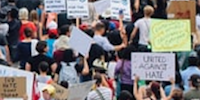William Ury
Director of the Global Negotiation Project, Program on Negotiation, Harvard Law School
Interviewed by Julian Portilla, 2003
This rough transcript provides a text alternative to audio. We apologize for occasional errors and unintelligible sections (which are marked with ???).
Q: And though it's organic, since this is the age of specialization, there's a whole cadre of people who dedicate themselves to this So let's take it back to Venezuela then. You show up in Venezuela, the bishop makes his three very relevant points, and then what happens?
A: So we broke up that afternoon into different groups, there was a media group for people interested in how do we help with the media, there's a business group and people started to talk about different initiatives, third side initiatives, to build a kind of internal peace movement within Venezuela. That was just a beginning meeting, then I was invited back a few months later. One of the things that really came up was the important role of the media in polarizing the conflict. The media was totally polarized: the private media were all against Chavez and then the government media were for him. And the media, by creating sort of like the ocean in which fish swim, it determines consciousness in some sense the media was really polarizing the conflict. And so I went back there a few months later, they invited me back, and said, "Well, let's focus on that. Let's see if we can have a seminar for journalists on both sides on ways to cover the conflict in ways that are constructive rather than destructive and polarized." And we had some very interesting sessions with the journalists, but one thing they told us was, "You know, we can do some things, but there's an editorial line which is set by the owners." So Francisco and I had a chance to meet with the owners of the private media and
Q: Major players there
A: Very major players, and in Venezuela they were perhaps the most powerful people in the country, and the richest. And they were quite skeptical, needless to say, because they had very strong opinions about Chavez and they thought he was communist, a Castroite, a terrorist, etc. And we met with them, and it took a few hours of very heated conversation, and then at the very end, after us trying to explain the situation to them and the conflict and the consequences of it - civil war - they asked if we would open up a dialogue between them and President Chavez. And that's the way the third side works.











